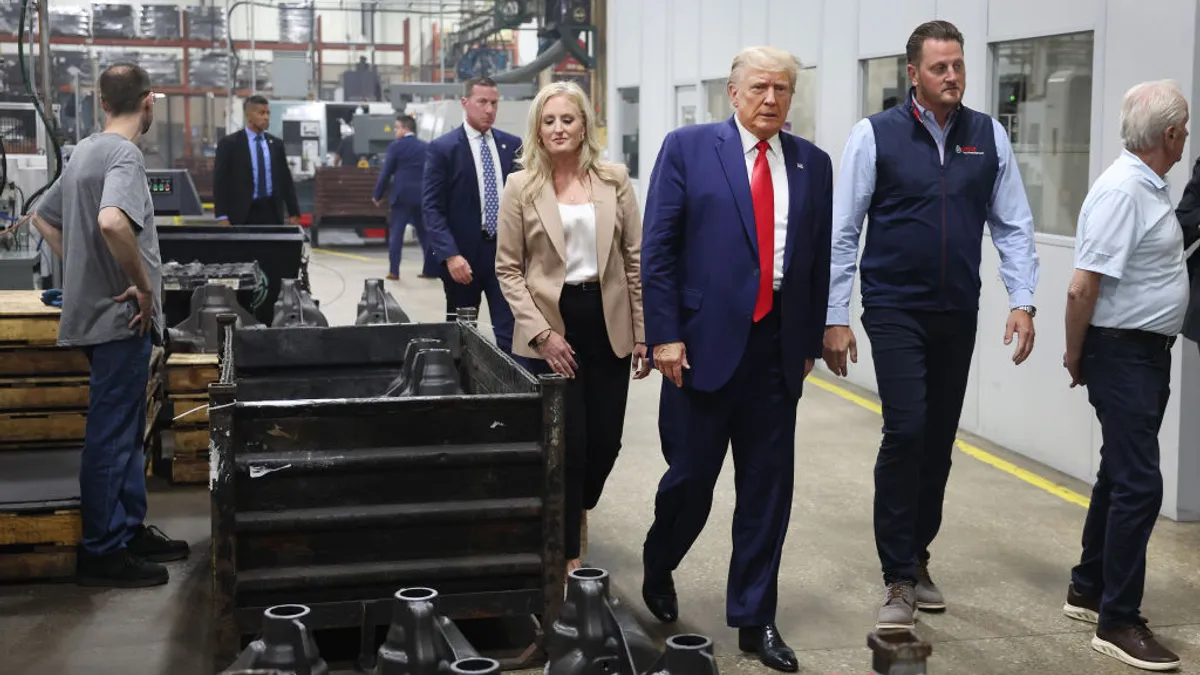Dive Brief:
- More than half (54%) of unionized autoworkers represented by Unifor in Canada voted over the weekend to approve a three-year collective bargaining agreement with Ford Motor Co., the organizations said Sunday.
- The agreement includes a 15% general wage increase over three years, a $10,000 ratification bonus for full-time employees and a $4,000 ratification bonus for part-time workers. It also reduces the new hire wage progression period from eight to four years.
- The union will soon announce the next automaker it will target for negotiations.
Dive Insight:
Unifor, a union representing 18,000 autoworkers in Canada, targeted Ford in its collective bargaining negotiations with the Big Three automakers. Now that the union has signed a contract with Ford, it will use that agreement as a blueprint for renegotiating labor contracts with General Motors and Stellantis. But negotiations with GM and Stellantis remain on hold until the union announces which automaker it will target next.
The new agreement “fundamentally transforms pension plans, provides protections during the EV transition and includes the highest wage increases in the history of Canadian auto bargaining,” Unifor said in a statement.
The contract covers over 5,600 unionized autoworkers at Ford’s Oakville Assembly Plant in Oakville, Ontario, and Annex and Essex Engine plants in Windsor, Ontario. It also includes three parts distribution centers in Ontario and one in Alberta.
Under the agreement, general wages will rise 10% in year one, with increases of 2% in year two and 3% in year three. Base hourly wages will also increase nearly 20% for production workers and 25% for skilled trades over three years. Ford also agreed to restore cost-of-living adjustments.
Hourly production workers employed by Ford of Canada will now earn 35% more than similar Ford employees in the U.S., Unifor said.
Unifor said a union Ford worker in Canada with one year of seniority would get an 80% wage increase, including projected cost-of-living adjustments, over the life of the agreement, plus the $10,000 ratification bonus.
The contract also provides improved pension benefits, including a plan to transition Unifor members with defined contribution plans and new hires to a defined benefit plan on Jan. 1, 2025. Retirees and current autoworkers will also see health benefit improvements and receive two more paid holidays, Unifor said.
Ford will also provide autoworkers at its Oakville Assembly Complex, with “extended and enhanced income and eligibility” as the company retools the plant for electric vehicle production, the automaker said. The company will also invest more in its Essex Engine Plant and add manufacturing capacity.
Experts said a Unifor strike in Canada would disrupt the U.S. auto industry because the countries’ automotive supply chains are closely intertwined.
Unifor is following the same pattern bargaining strategy the United Auto Workers union has used historically in its negotiations with the Big Three in the U.S. In contrast, the UAW is negotiating with all three automakers simultaneously this year. The UAW went on strike after failing to reach labor agreements with GM, Ford and Stellantis by its Sept. 14 deadline.














